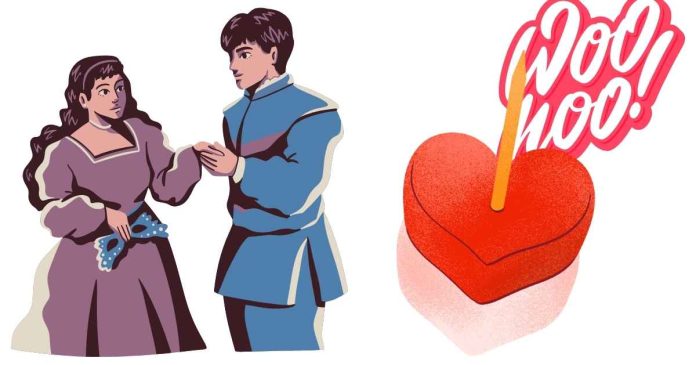The word “woo” in Romeo and Juliet has its roots in older English, where it was used to describe the act of courting or seeking someone’s romantic affection, typically with the goal of marriage or a serious romantic relationship. In Shakespeare’s time, this was a more formal or ritualized process, and the term “wooing” was connected with not just expressing love, but with doing so in a respectful, earnest, and sometimes even elaborate manner.
In Romeo and Juliet, the term is used several times to convey the idea of a suitor trying to win over the love or approval of the object of his affections. This is especially important given the social and familial context of the play. Romeo and Juliet’s relationship begins with Romeo “wooing” Juliet in the traditional sense — through dialogue and gestures that are meant to express his admiration and affection.
For instance, in Act 1, Scene 5, when Romeo and Juliet first meet, Romeo uses a poetic form of wooing as he speaks to her. He engages in a metaphorical “courtship” using a sonnet, which is a traditional form of love poetry, suggesting a formal pursuit of Juliet’s heart. He says:
“If I profane with my unworthiest hand
This holy shrine, the gentle fine is this:
My lips, two blushing pilgrims, ready stand
To smooth that rough touch with a tender kiss.”
Here, Romeo is using a metaphor of pilgrimage to describe the act of wooing, comparing Juliet’s lips to a “holy shrine” and himself to a pilgrim who is seeking to worship or revere her. This type of speech, filled with reverence and charm, is part of the traditional idea of wooing — to court with admiration, care, and respect.
Another moment where “wooing” appears is when Juliet’s nurse talks about Paris wooing her. The nurse says in Act 1, Scene 3:
“No less! Nay, bigger! Women grow by men.
Speak briefly, can you like of Paris’ love?”
Here, the concept of wooing extends to the idea of potential marriage, as Juliet’s mother wants her to consider Paris’ suit. In this case, “wooing” is understood as an official courtship with the aim of marriage, particularly since Juliet’s family is keen on the idea of her marrying Paris, who is seen as a suitable match.
In a more general sense, “woo” in Shakespeare’s time carried a more formal, ceremonial air to it, implying that the process was about not just expressing love but proving one’s worthiness to be in a relationship, often involving gifts, poetry, gestures, and dedication. In Romeo and Juliet, this concept is key to understanding the emotional stakes of the characters and the societal expectations they are trying to navigate.


